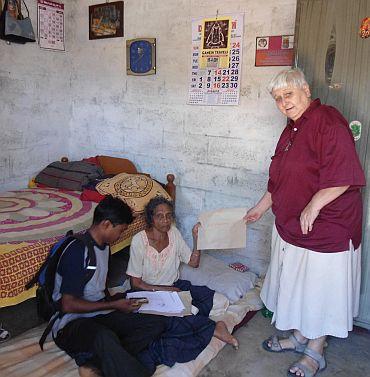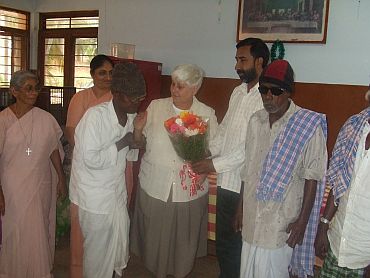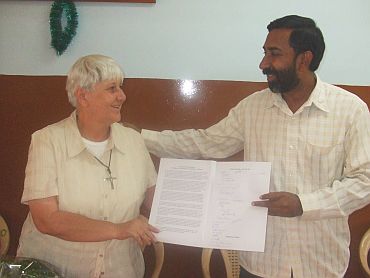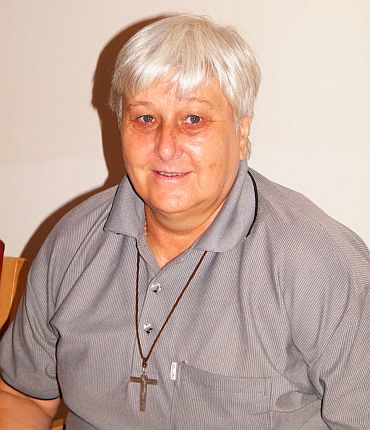 | « Back to article | Print this article |
Meet the Mother Teresa of Sumanahalli
In a tiny corner in Bengaluru, Sister Jacqueline Jean McEwan has been quietly serving poor leprosy patients for 30 years. Shobha Warrier meets the nun the locals call their own Mother Teresa.
Sister Jacqueline Jean McEwan sees God's hand in all that has happened in her life -- whether it was her becoming a nun or coming to India or taking care of the leprosy patients in Bengaluru or the Government of India asking her to go back to the UK after 30 years and then reverting the decision just 20 minutes before her departure on July 26 this year.
"I see God's hands in everything that has happened," says the soft-spoken Sister Jean, 63, in a barely audible voice.
The nun was born in Newcastle, England, and her mother died when she was just six. She had died after a prolonged bout of tuberculosis, so her father wanted her to be a doctor.
When she was 18, she trained to become a nurse instead. "I always knew I would become something in the medical field. That was the desire with which I grew up. It all started as my father's desire, but soon became mine. I found that what I really wanted to do was to serve people."
Other than nursing, she also trained herself in midwifery. "That was a call from God I had to take. I loved delivering babies and nursing mothers."
Please click NEXT to read further...
'I never expected it to be so bad'
Images of nuns from her school serving the poor in Africa remained with her from childhood. Even as a small girl, there was this inner desire to become a nun and serve the people.
One day she heard the call from God that he wanted her to enter the congregation. "It came from inside and I felt he was calling me to serve. When he calls, you can't say no. It all started like a seed, a pain, and then it grew bigger. When you want to be in service, going by yourself is very difficult. When you are in the congregation, you are going with other sisters to serve people. Yes, Mother Teresa left the congregation and started her own congregation to serve people. I don't think I would have that courage."
In 1976, Jacqueline became Sister Jacqueline Jean and when she was asked what she wanted to do, she said she was a midwife and wanted to help women deliver. She was sent to work as a midwife.
"It is a wonderful feeling when a baby is being delivered. Taking it first in your hands and hearing its first cry -- it's wonderful. I must have done a thousand deliveries, but never got tired of it."
The year 1982 was a turning point in her life; she decided to come to India to help the Sumanahalli Society for the Welfare and Rehabilitation of Leprosy Patients.
Several religious congregations were behind the Sumanahalli Society. Father Michaelangelo of Montfort Missionaries, a congregation of the Catholic church founded in France in the 18th century, was looking for a medical team to come to Bengaluru to work with the leprosy-affected.
"God wanted me here," says the nun. "I have no other explanation for my coming here. God wanted me to come here and serve."
Since there was another Sister Jacqueline in the team, she came to be known as Sister Jean from then on. Though Bengaluru looked so different from the UK, she confesses she felt "at home straight away." The nuns -- two Canadians, two Italians and a Columbian -- became her new family in the city. "It is like I have two homes now."
Sister Jean started working with the leprosy patients. "I still remember going to see a woman living in a mud hut in Seshadripuram. There was no light and the place was very unhygienic. I knew it was bad, but never expected it to be so bad. I was appalled. Coming from a modern city to see such a situation was traumatic. There was a big gulf. I felt challenged."
She decided that it was not sympathy, but empathy that the leprosy-affected needed.
In no time, she knew every patient by name. "As I was very poor with (learning) languages, what helped me was remembering everyone's names. It makes them happy when you address them by their names."
Please click NEXT to read further...
'I don't think anybody would treat even a criminal like this'
Father George Kannanthanam, director of the Sumanahalli Society for the Welfare and Rehabilitation of Leprosy Patients, says, "She remembers the names of most of the 5,000-odd patients that Sumanahalli has treated in the past 29 years -- something we Indians find so hard."
"While she could afford a car or an autorickshaw daily for her travel," adds Father George, "she travels either by bus or most often on her moped, without complaint."
When she first arrived in Bengaluru, she had no idea how long she would stay. "There was a call and I just answered the call. It is almost 30 years and I am still here."
It is not that she never thought of going back. "At the back of your mind, you knew one day you would go back. I wanted to take up Indian citizenship, but only if I gave up my British citizenship. I am told now India encourages dual citizenship. Also, as I grow older, I want to stay only till I have the energy to work."
A few months ago, the nun was on the verge of being deported. When she arrived in India in 1982, there was no need for a visa; citizens of Commonwealth countries could travel to each other's country so. She regularly renewed the residency permit, which was given to her in 1984. When she applied to renew her residency permit this year, to her shock, she was denied permission to stay.
"It came as a shock to me. The letter from the police said I had to leave in seven days. I was stunned, yet calm. We British do not cry. We are cold-blooded (laughs)! But that doesn't mean we are not crying inside."
Father George is still upset about the way she was treated. "I don't think anybody would treat even a criminal like this. She, a person who has been relentlessly serving the poor, was given just seven days to pack and leave the country. Is this the way to treat a kind soul? She takes care of all like a mother. No wonder she is called 'Amma' by all the patients."
The course of events thereafter made Sister Jean realise that God's call continues even today. "Otherwise, I cannot explain how things have turned out. First, I was asked to pack and go in seven days. I didn't know how I would wind up all that I was doing in such a short time."
Please click NEXT to read further.
'I have unfinished work to do'
What happened in the last 20 minutes of her stay in India was nothing short of a miracle.
She was about to get into the van to go to the airport when Father George arrived and told her, 'Don't go. You have got one month's extension with options to review the papers.' She looked at him and asked, 'Are you joking?'
He was not. After the hue and cry the decision created, Union Home Minister P Chidambaram said the notice issued by the Foreigners Regional Registration Office in Bengaluru was a mistake and that the nun could stay in India for as long as she wanted. Father George said the new papers say she can stay till her passport expires.
When she discovered that the decision has been revoked, she decided to go first to the clinic.
Sister Jean sees God's hands in the home ministry asking her to stay for as long as she desires. "God knows there is a lot more work to be done, and I have some more unfinished work to do."
It was a very emotional moment for Sister Jean when all the patients who came to bid her goodbye started asking her to stay with tears in their eyes. "I saw joy in their eyes when they knew I was not going. They tell me now that I must never go back."
Mastan, who works with her, says, "We will not allow her to go back. We will not be able to perform our duties without her. You should see the way she keeps the wounded leg on her thigh and dresses it. Only those with pure love can do it. Who else will be available to patients 24x7? Even at midnight, she would get up and attend a patient. That is why she is called the Mother Teresa of Sumanahalli."
"When I got christened like that by somebody," says Sister Jean. "I felt uncomfortable and ashamed. Mother Teresa was a wonderful soul. She could cut strings and do what she wanted. Comparing me to her is like putting a school play on a big stage. I like to think that those who christened me did that out of pure love!"



